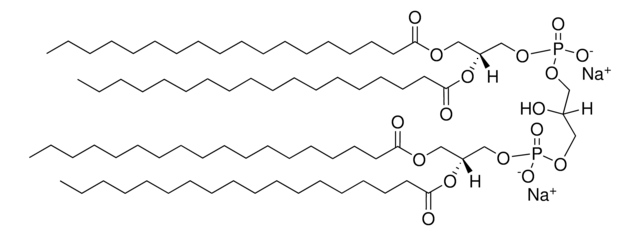C2436
Cytochrome c from Saccharomyces cerevisiae
≥85% based on Mol. Wt. 12,588 basis
Sign Into View Organizational & Contract Pricing
All Photos(3)
About This Item
Recommended Products
biological source
Saccharomyces cerevisiae
Assay
≥85% based on Mol. Wt. 12,588 basis
form
powder
mol wt
12,588 Da
technique(s)
cell based assay: suitable
solubility
water: 10 mg/mL, clear, red to red-brown (dark red)
UniProt accession no.
application(s)
cell analysis
storage temp.
−20°C
Gene Information
Saccharomyces cerevisiae ... CYC1(853507)
General description
Cytochrome c (Cytc) comprises 104 amino acids and is a nuclear-encoded mitochondrial protein. This peripheral membrane protein is in spherical shape and has a molecular weight of 12,000 Da.
Application
Cytochrome c from Saccharomyces cerevisiae has been used in oocyte injection to induce caspase-3 activation and p38 MAPK (mitogen-activated protein kinase). It has also been used to analyze the aerobic reactions of nitric oxide.
Biochem/physiol Actions
Cytochrome c (Cytc) participates in mitochondrial electron transport and intrinsic type II apoptosis. It plays a key role in aerobic energy production. This multi-functional enzyme serves as a single electron carrier. Cytc helps in the formation of the apoptosome.
The ready fluctuation of cytochrome c within the cell between ferrous and ferric states, makes it an efficient biological electron-transporter. It plays a vital role in cellular oxidations in both plants and animals. Generally regarded as a universal catalyst of respiration, it forms the essential electron-bridge between the respirable substrates and oxygen. Tracking cellular localization of cytochrome c in S. cerervisiae demonstrates that mitochondria are strongly involved in programmed cell death, a process very similar to apoptosis in higher organisms.
Quality
Care has been taken to maintain the native form of the protein. It has not been artificially oxidized or reduced during purification. Contains variable amounts of reduced cytochrome c.
Preparation Note
Prepared without using TCA.
Other Notes
View more information on cytochrome c and electron transport at www.sigma-aldrich.com/enzymeexplorer.
Storage Class Code
11 - Combustible Solids
WGK
WGK 3
Flash Point(F)
Not applicable
Flash Point(C)
Not applicable
Personal Protective Equipment
dust mask type N95 (US), Eyeshields, Gloves
Certificates of Analysis (COA)
Search for Certificates of Analysis (COA) by entering the products Lot/Batch Number. Lot and Batch Numbers can be found on a product’s label following the words ‘Lot’ or ‘Batch’.
Already Own This Product?
Find documentation for the products that you have recently purchased in the Document Library.
Customers Also Viewed
Basic Properties of the p38 Signaling Pathway in Response to Hyperosmotic Shock
Messaoud NB, et al.
PLoS ONE, 10(9) (2015)
Ryota Yamasaki et al.
Biotechnology for biofuels, 11, 211-211 (2018-08-01)
We previously reversed methanogenesis in microbial fuel cells (MFCs) to produce electricity for the first time from methane by combining an engineered archaeal strain that produces methyl-coenzyme M reductase from unculturable anaerobic methanotrophs (to capture methane and secrete acetate) with
Membrane Proteins
The Membranes of Cells, 219-268 (2016)
Reactions of nitric oxide with mitochondrial cytochrome c: a novel mechanism for the formation of nitroxyl anion and peroxynitrite
SHARPE MA and Cooper CE
The Biochemical Journal, 332(1), 9-19 (1998)
The multiple functions of cytochrome c and their regulation in life and death decisions of the mammalian cell: from respiration to apoptosis
Huttemann M, et al.
Mitochondrion, 11(3), 369-369 (2011)
Chromatograms
application for HPLCapplication for HPLCapplication for HPLCOur team of scientists has experience in all areas of research including Life Science, Material Science, Chemical Synthesis, Chromatography, Analytical and many others.
Contact Technical Service






